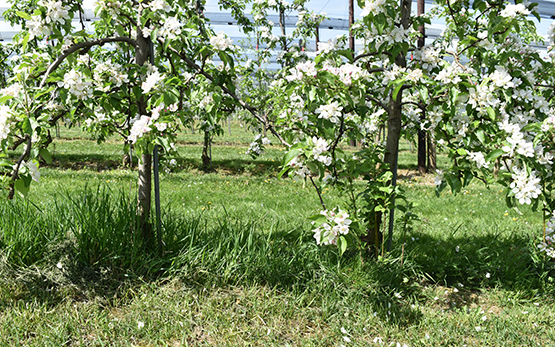Although the high rainfall in Switzerland on the northern side of the Alps generally rules out the need for irrigation in apple production, climate change has meant that even in this region fruit producers are increasingly faced with longer periods of drought. With persistent dry spells, as for example in the summer of 2018, losses in terms of fruit quality or harvest volume must be expected without additional supplies of water. Because this problem only arises every few years, installing an irrigation system is in many cases unsustainable, both for economic reasons and owing to the scarcity of water resources.
In order to ensure efficient water use without additional irrigation even in dry years, the Interreg Project ‘Preventive Water Management in Fruit Production’ is testing various approaches for improving water availability:
Incorporation of water-retaining additives in the soil when planting young plantations
- Humus formation
- Impact of tillage on water available to plants in soil
- Use of mulching methods and materials
- Ways to reduce evapotranspiration through the use of growth regulators
The aim of these measures is to increase soil water-retention capacity and minimise evapotranspiration via soil and plants. The measures developed in the project enable Agroscope, cantonal agencies and extension organisations to recommend targeted preventive measures for improving the water balance in orchards. Thanks to cross-border cooperation with partners in Germany (Weihenstephan-Triesdorf University of Applied Sciences HWST, Lake Constance Competence Centre for Fruit Production KOB, Bavarian State Research Centre for Viticulture and Horticulture LWG, Lindau Fruit Growers’ Producer Association, Organic Fruit Growers’ Extension Service) and Austria (Voralberg Chamber of Agriculture), these recommendations can be supported by a broad knowledge base. After the project has ended, the strategies for improved preventive water management that are of interest for practitioners will be summarised and published in the form of a pamphlet. The project runs from 2020 to 2023.






